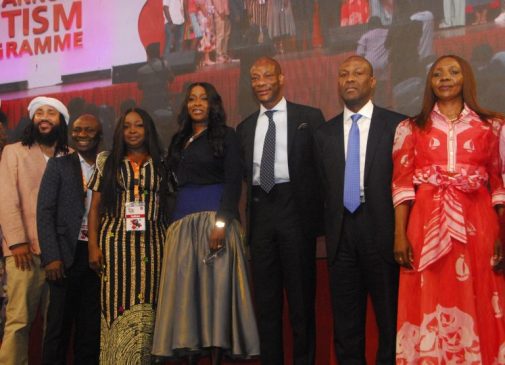*L–R: Rashard Dobbins, Performer and Production Professional; Lanre Duyile, Behaviour Analyst and Consultant; Solape Azazi, Behaviour Analyst and Autism Advocate; Oyinade Adegite, Chief Communications Officer, GTCO Plc; Segun Agbaje, Group Chief Executive Officer, GTCO Plc; Babajide Okuntola, Deputy Managing Director, GTBank and Grace Bamgboye, Consultant Speech-Language Pathologist at the 15th edition of the GTCO Autism Conference held at the MUSON Centre, Lagos.
In a powerful demonstration of its unwavering commitment to social change, Guaranty Trust Holding Company (GTCO) marked the 15th anniversary of its dedicated autism advocacy with the flagship event, the Orange Ribbon Initiative, under the theme “From Awareness to Action: 15 Years of Advancing Autism Inclusion.” This milestone celebration underscores GTCO’s ongoing dedication to transforming perceptions, policies, and lives through education, support, and advocacy.
The event kicked off on Wednesday, July 16, 2025, at the Muson Centre in Onikan, Lagos, and was followed by personalized clinic consultations scheduled from July 17 to 19 at the Adeyemi Bero Auditorium in Ikeja’s Alausa Secretariat. Demonstrating its regional influence, the initiative will hold its second edition in Ghana from July 21 to 24, hosted at the University of Professional Studies in Accra.
Segun Agbaje, GTCO’s Group CEO, reflected on the journey: “What began as a focused effort has evolved into a movement that shapes how we advocate, listen, and respond to autism. Our Autism Programme is built on a foundation of acceptance, early intervention, and a future where every child has the chance to thrive. This 15th-year milestone reaffirms our commitment: inclusion and acceptance are responsibilities we all share. Progress is measured not just by policies but by the opportunities we create daily for children and individuals on the spectrum.”
He emphasized that the campaign’s scope extends beyond awareness, actively promoting dialogue, learning, and tangible support for those living with autism. “We remain dedicated to advocacy, empowering children and adults with autism, and fostering a compassionate society where everyone’s potential is recognized and nurtured,” Agbaje stated.
The GTCO Autism Programme offers a comprehensive suite of initiatives, including annual conferences, free consultations with local and international autism specialists, panel discussions, and training tailored for caregivers, educators, and healthcare professionals. Over the years, thousands of families across Nigeria and Ghana have benefited from these efforts, with Agbaje noting that “the knowledge shared has become a transformative tool for many.”
Experts explain that individuals with Autism Spectrum Disorder (ASD) often face challenges with communication, social interaction, and sensory processing, which can hinder relationship-building and social integration. Acknowledging these hurdles, Agbaje highlighted the unique strengths of those on the spectrum: “While they face challenges, they also possess remarkable talents and creativity. Our goal is to support them in overcoming obstacles while fostering their innate abilities.”
He reaffirmed GTCO’s steadfast dedication: “Our campaign has impacted over 5,000 families over 15 years, and we will never stop working to make a difference. Through collaborations with local and international organizations—such as Autism Compassion Africa, Behaviorprise Consulting, The Colour of Autism Foundation, and Nigeria’s Yaba and Aro Neuropsychiatric Hospitals—we are transforming awareness into meaningful action across borders. Our mission is to ensure that individuals with autism are embraced, supported, and empowered to succeed.”
Reflecting on the journey since its inception in 2009, Agbaje shared: “What started as a simple promise has grown into a social movement rooted in acceptance and early intervention. Today, we continue to advocate for a future where every child is given the opportunity to thrive, regardless of neurodevelopmental differences.”
He also highlighted the importance of cross-border collaboration in broadening the campaign’s impact, emphasizing the importance of neurodiversity inclusion, public awareness, and mental health advocacy across Africa. The 2025 conference drew educators, therapists, medical professionals, families, NGOs, and policymakers committed to building an inclusive continent where no child is left behind.
Agbaje expressed gratitude to the programme’s partners, including Autism Compassion Africa, Behaviorprise Consulting, The Colour of Autism Foundation, and Nigeria’s leading neuropsychiatric hospitals, acknowledging that “these collaborations are vital in providing sustained support to persons on the autism spectrum and their families.”
Addressing societal challenges, Agbaje pointed out the barriers faced by people with autism in education, employment, and healthcare—barriers often compounded by misconceptions, stigma, and inadequate support. Mental health issues like anxiety and depression are also prevalent among autistic individuals due to social difficulties and misunderstandings.
Chief Communication Officer Oyinade Adegite highlighted the campaign’s progress: “We’ve moved from mere awareness to tangible actions—reaching communities in Lagos, Abeokuta, and Ghana—and consolidating data to produce a comprehensive impact report. Our efforts have touched over 5,000 families, and beyond numbers, we are challenging perceptions and reducing stigma.”
Experts like Dr. Grace Bamgboye, a Speech-Language Pathologist, emphasized the importance of dispelling myths: “Autism is neurological, not spiritual. In Nigeria, misconceptions blame causes like snail consumption or spiritual attacks, but the focus must shift to evidence-based support. We need to stop blaming parents or resorting to harmful practices and instead prioritize early detection and intervention.”
Personal stories, such as that of Solape Azazi, who attended the conference eight years ago and now advocates actively for children with autism, underscore the campaign’s transformative impact. Azazi shared: “Attending that first conference was the start of my journey to support my son and others. Now, I help many families find hope and guidance.”
Behavior analyst Osezusi Bolodeoku emphasized the practical focus of the 2025 conference: “We’re providing real-world, accessible strategies to support individuals with autism every day—because not everyone can afford specialized therapy, but everyone can benefit from understanding and support.”
A flagship component of the campaign remains the annual Autism Conference in Lagos, a key platform for advocacy, education, and collaboration. Featuring expert presentations, workshops, and personalized consultations, the event aims to empower families and professionals alike.
Notable speakers like Camiella Hay, a behavior analyst, and Oyeyemi Adako, who discusses “Unlocking Silence Potential,” highlight intervention strategies like sensory diets and tailored support to unlock each individual’s capabilities.
Autism advocacy leaders like Rashard Dobbins of Class Act Detroit stress the importance of shifting societal perceptions: “Autism is a spectrum, and understanding that diversity is vital. We need to move from stereotypes to acceptance, ensuring access to resources and opportunities for all on the spectrum.”
Innovators like Nadia Hamilton, Founder of Magnus Cards, promote technological solutions that foster independence: “Our app provides visual guides for daily routines, empowering individuals with autism to live more independently and confidently.”
Speech and language therapists like Tomi Agboola Odeleye advocate for society’s understanding: “Autism affects about 10% of the population and isn’t spiritual or solely genetic. It’s a neurodevelopmental difference, and society’s acceptance and understanding are crucial to supporting these individuals.”
The conference reaffirmed that early detection, intervention, and societal inclusion are essential to helping individuals with autism lead independent, meaningful lives. Through continuous advocacy, collaboration, and education, GTCO’s initiatives are transforming lives and building a more inclusive future across Nigeria, Ghana, and beyond.




